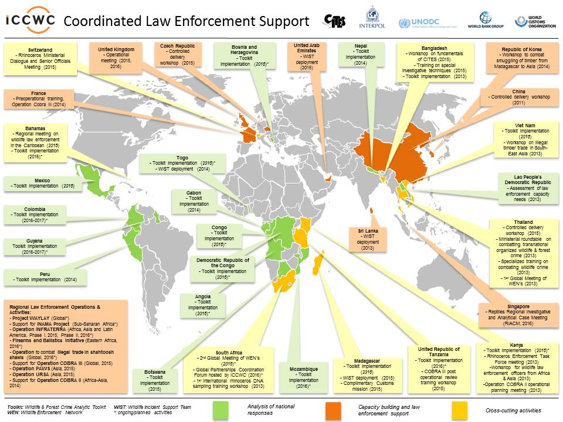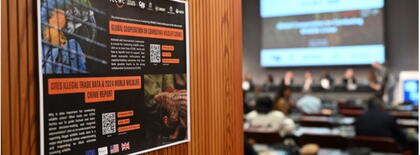For use of the media only;
not an official document.
PRESS RELEASE
Global consortium strengthens efforts to tackle wildlife crime
 The International Consortium on Combating Wildlife Crime (ICCWC) will host three high profile events during CITES #CoP17, to further strengthen collaborative efforts against illicit wildlife trafficking that is decimating species, livelihoods and economies.
The International Consortium on Combating Wildlife Crime (ICCWC) will host three high profile events during CITES #CoP17, to further strengthen collaborative efforts against illicit wildlife trafficking that is decimating species, livelihoods and economies.
- The Global Partnerships Coordination Forum on 25 September, moderated by the World Bank on behalf of ICCWC, will include a high level panel discussion with representatives from the Convention on International Trade in Endangered Species of Wild Fauna and Flora(CITES) Secretariat, the World Customs Organization (WCO), the United Nations Office on Drugs and Crime (UNODC), the United Nations Development Programme (UNDP) and the African Union Commission among others, to explore different perspectives on how law enforcement, development, environmental and social approaches can contribute to combating illegal wildlife trade. The Forum will include a dialogue with CITES Parties to identify any gaps that may exist in current approaches to combating wildlife crime.
- On 26 September, at a side event, the ICCWC will profile the first-ever World Wildlife Crime Report, launched in May this year at the UN Commission on Crime Prevention and Criminal Justice. The report highlights that illicit wildlife trafficking affects countries across the globe, and that poaching and illegal trade of thousands of different species not only present real environmental dangers but ultimately undermines the rule of law. The Consortium will also launch a new anti-money-laundering training programme on wildlife crime and update CITES Parties on the development of an Indicator Framework for Wildlife and Forest Crime, that will enable countries to measure and monitor their responses to it. The side event will further focus on different forms of operational support that have and could be mobilized by the Consortium, to support countries in the fight against wildlife crime.
- The Second Global Meeting of Wildlife Enforcement Networks (WENs) will be convened by ICCWCon 28-29 September, where representatives from over 15 networks from around the world, wildlife law enforcement officers, and a broad range of organizations will share experiences and consider measures to further strengthen WENs, and regional and global cooperation. The meeting will also consider the feasibility of developing best practice guidelines for the establishment and strengthening of WENs, as well as the development of targeted operational activities at the regional or global level.
The ICCWC is a powerful collaboration between the CITES Secretariat, INTERPOL, UNODC, the World Bank and the WCO. The Consortium develops innovative tools and provides crucial services for the law enforcement community, delivering coordinated enforcement support to ensure that national authorities are equipped to respond to the threat posed by transnational organized wildlife crime.
John E. Scanlon, Secretary-General of CITES said: “Over the next two weeks, Parties to the Convention on International Trade in Endangered Species of Wild Fauna and Flora (CITES) will take important decisions in the interests of protecting our planet’s most precious wildlife. Over 500 species will be affected – some of which are illegally traded across the globe at alarming levels.
“The heightened political will and well-targeted actions by international organizations and governments reflect a real concern over the global multi-billion dollar wildlife crime that is driven by organised criminal groups. The Consortium works with the law enforcement community, as it is these frontline officers who will bring criminals engaged in wildlife crime to justice.”
Since Parties last met in Bangkok in 2013, the ICCWC has delivered on-the-ground support in over 30 countries. This has included the development of Guidelines on Methods and Procedures of Ivory Sampling and Analysis, a Best Practice Guide for Forensic Timber Identification, as well as the implementation of the ICCWC Wildlife and Forest Crime Analytic Toolkit, which provides government officials, customs, police and other relevant enforcement and criminal justice actors with a framework to conduct a comprehensive analysis of the national response to wildlife, forest and related crime, and identify the country’s technical assistance needs. In addition, the Consortium has provided specialized training and technical and operational support through the deployment of Wildlife Incident Support Teams to Madagascar, Sri Lanka, Togo and the United Arab Emirates to assist with investigations, capacity assessment and with ivory sampling.
The ICCWC supported a number of operational activities including to combat the illegal trade in Shatoosh shawls and various phases of Operation INFRA TERRA, an INTERPOL led global operation in 2014 and 2016 to track, trace and arrest wanted fugitives for wildlife crimes. The Consortium also supported projects on Controlled Deliveries, a specialized law enforcement technique used to investigate cases beyond the point of seizure and, as well as others.
The executive heads and delegates of the five ICCWC partner organizations met on 23 September alongside #CoP17 to review the Consortium’s progress since its inception in 2010. They also discussed the implementation of ICCWC’s Strategic Programme over the next four years with a focus on strengthening criminal justice systems and providing coordinated support at national, regional and international level to combat wildlife and forest crime.
Scanlon said: “CoP17 will provide a critical space for policymakers and law enforcement practitioners from all regions of the world to come together and exchange ideas on enhancing efforts to protect wildlife from organised criminal groups. The ICCWC has played an central role in assisting Parties through providing coordinated support and access to much-needed resources and training.”
To coincide with #CoP17, the ICCWC website has been updated to include the latest information and activities of the Consortium, including the latest tools and services developed by the Consortium and key activities that have been conducted across the globe to assist member states to combat the illegal wildlife trade.
A number of additional events held by ICCWC partners will be organized alongside #CoP17. These include:
• A side event on Wildlife Forensics for CITES Implementation (27 September);
• A side meeting on Corruption: the elephant in the room (28 September); and
• A Global Wildlife Programme side event on International Donor Funding Analysis to Combat illegal wildlife trade’ (3 October).
For the first time, a meeting of the INTERPOL Wildlife Crime Working Group (the 27th Meeting) will also be held alongside a CITES CoP,from 2 to 4 October 2016.
Note to Editors: For interview requests, please contact Victoria Holdsworth, Head of Media, CITES #CoP17
Victoria.Holdsworth [at] cites.org (Victoria[dot]Holdsworth[at]cites[dot]org) or Tel: +447736773093
Additional information on the various events organized will be distributed at #CoP17.
For more information on ICCWC please visit: /eng/prog/iccwc.php
The #CoP17 document on the International Consortium on Combating Wildlife Crime (ICCWC) can be found on: /sites/default/files/imported-news/E-CoP17-14-02.pdf
An information document on the International Consortium on Combating Wildlife Crime (ICCWC) submitted to #CoP17 can be found on: /sites/default/files/imported-news/E-CoP17-Inf-33.pdf



